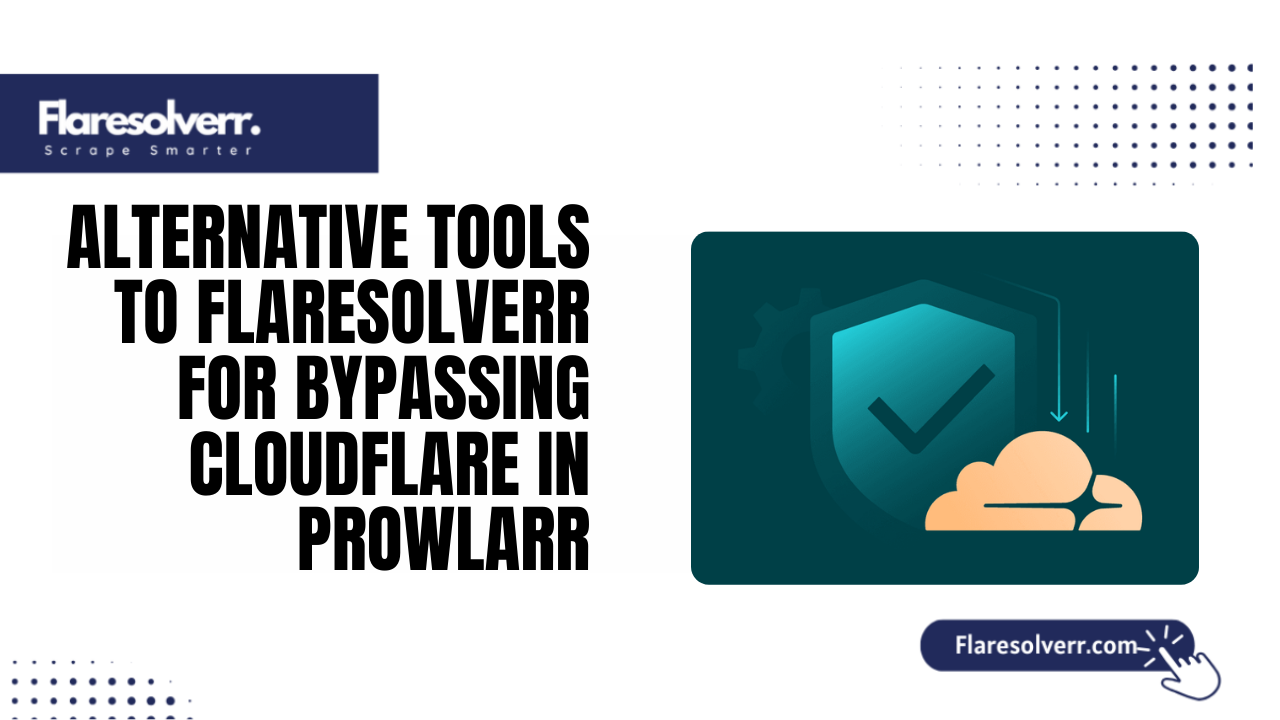Table of Contents
ToggleIntroduction
If you’ve ever used Prowlarr, you know how pesky Cloudflare can be. Those security checks can block your automated indexers, slowing down your media downloads and frustrating your workflow. That’s why having a reliable bypass tool is essential;
it keeps everything running smoothly without constant interruptions. FlareSolverr has been the go-to solution for many, but it’s not the only player in town.
Why Bypassing Cloudflare Matters for Prowlarr
Cloudflare’s protection is a blessing for websites, but a challenge for automation. Prowlarr relies on fetching data from multiple indexers, and hitting Cloudflare blocks can cause failed requests or timeouts. Without a bypass, your media automation workflow grinds to a halt.
How FlareSolverr Fits into the Workflow
FlareSolverr acts like a bridge between Prowlarr and Cloudflare-protected sites. It handles JavaScript challenges and captcha prompts, delivering clean responses that Prowlarr can use to update your indexers. While highly effective, FlareSolverr isn’t perfect.
What Are the Main Alternatives to FlareSolverr?
If FlareSolverr doesn’t suit your setup, you still have solid alternatives to explore. From lightweight tools to advanced automation frameworks, each option offers different levels of flexibility and performance. Your choice depends on whether you prioritize lower CPU usage, handling multiple requests, or smooth Prowlarr integration.
For comparison, reviewing FlareSolverr’s key features helps highlight where these tools differ.
Overview of Popular Tools for Cloudflare Bypass
Some top alternatives include Pyppeteer, Cloudscraper, and Playwright. Pyppeteer is great for Python users and handles complex JavaScript challenges effectively. Cloudscraper is lightweight and straightforward to implement for small-scale automation. Playwright is more advanced, offering cross-language support and robust automation capabilities for larger setups. Each tool comes with its own setup process, learning curve and resource requirements.
Key Differences Between These Alternatives and FlareSolverr
If FlareSolverr doesn’t suit your setup, you still have solid alternatives to explore. From lightweight tools to advanced automation frameworks, each option offers different levels of flexibility and performance. Your choice depends on whether you prioritize lower CPU usage, handling multiple requests, or smooth Prowlarr integration.
For comparison, reviewing FlareSolverr’s key features helps highlight where these tools differ.
Using Pyppeteer for Cloudflare Challenges
Puppeteer is a fantastic alternative to FlareSolverr if you’re looking to bypass Cloudflare challenges with a more hands-on approach. It’s essentially a Python version of Puppeteer, giving you complete control over browser automation.
This makes it perfect for Prowlarr users who want to maintain smooth indexing without constantly running into Cloudflare roadblocks.
Installation and Setup Guide
Getting started with Pyppeteer is surprisingly simple. First, ensure that you have Python installed, and then run a quick pip command to install the library. From there you can set up your scripts to launch a headless browser, navigate to your target indexers and handle Cloudflare challenges programmatically.
If you’re experiencing high CPU issues with Prowlarr and FlareSolver, Puppeteer offers a lighter more customizable alternative that can be optimized to your system’s capabilities.
Pros and Cons Compared to FlareSolverr
Pyppeteer shines in flexibility and customization. You can control browser behavior, manage cookies, and even automate complex navigation steps. However, unlike FlareSolverr, it requires some coding knowledge, and setup might take longer if you’re not familiar with Python.
On the upside, you can fine-tune scripts to reduce CPU usage, which is perfect for avoiding Prowlarr high CPU spikes. The trade-off is time and effort during the initial setup, but for many, it’s worth the control you gain.
Tips for Optimizing Puppeteer in Prowlarr
To get the most out of Puppeteer, always run headless mode and limit the number of concurrent browser instances. Use brilliant error handling to retry failed requests without overloading your system. Rotating proxies and scheduling your scripts during off-peak times can also help reduce CPU load.
These tweaks ensure that Puppeteer stays efficient and doesn’t create unnecessary stress on your system while keeping Prowlarr running smoothly.
Cloudscraper: A Lightweight Option
Cloudscraper is a handy tool that allows you to bypass Cloudflare protections without the need for manual intervention. It’s lightweight, simple to set up, and perfect for users who want to avoid the CPU spikes that sometimes happen with larger tools like FlareSolver.
How to Install and Integrate with Prowlarr
Installing Cloudscraper is a breeze. If you’re using Python, a simple pip install cloudscraper gets you started. Once installed, you can integrate it with Prowlarr by connecting it to custom scripts or indexer configurations. For detailed instructions on adding FlareSolverr to Prowlarr, you can refer to our integration guide.
Handling Common Issues and Limitations
Even though Cloudscraper is lightweight, it isn’t magic. Some websites with aggressive anti-bot measures may occasionally block requests, requiring proxy rotation or slight adjustments to request headers. Keeping an eye on logs helps identify these issues before they escalate into larger problems.
Another limitation is that Cloudscraper doesn’t handle advanced captchas on its own.
Performance Tips for Stable Scraping
- Utilize effective proxy management to keep Cloudscraper running efficiently.
- Avoid sending excessive requests simultaneously to prevent system overload.
- Schedule requests and space them out to reduce the risk of prolonged high CPU spikes.
- Monitor system resources regularly and adjust concurrency levels as needed.
- Keep workloads within Cloudscraper’s capacity for optimal performance.
Playwright for Advanced Automation
Playwright is a fantastic tool for advanced automation, and it’s quickly becoming a favorite alternative to FlareSolverr for bypassing Cloudflare in Prowlarr. It lets you mimic real human browsing, making it harder for sites to block your requests.
Setting up Playwright with Python or Node.js
Getting started with Playwright is simple. For Python, install the Playwright package and run’ playwright install’ to set up browsers. Node.js users can install it via npm and follow the same steps. Once installed, you can script automated interactions with your Prowlarr indexers.
Using it to bypass Cloudflare protections effectively
The playwright excels at bypassing Cloudflare protections by simulating real user actions, such as clicks, scrolls, and delays. It can handle dynamic content and basic challenge pages ensuring uninterrupted indexing.
Unlike some simpler tools, Playwright reduces the likelihood of triggering blocks while maintaining your Prowlarr workflow’s efficiency and responsiveness.
When to choose Playwright over other tools
You should consider Playwright when you need reliability and fine-grained control. If you’ve noticed Prowlarr’s high CPU usage with FlareSolverr or other heavy alternatives, Playwright offers a smoother experience.
It’s ideal for advanced users who require stable long-term automation without the need for constant setting adjustments or handling failed requests.
Proxy Management with Alternative Tools
Managing proxies is one of the trickiest but most crucial parts of bypassing Cloudflare in Prowlarr. Using the right proxies ensures that your requests don’t get blocked and it keeps your scraping tasks smooth and uninterrupted.
Choosing the Right Proxies for Stability
When using alternative tools to FlareSolverr in Prowlarr, the type of proxy you choose can make a huge difference. Residential proxies are generally more reliable for bypassing Cloudflare because they mimic real users while datacenter proxies can be faster but risk being blocked more often.
Picking proxies with good uptime and low latency ensures smoother indexing and fewer interruptions.
Rotating IPs to Avoid Cloudflare Bans
Constant requests from a single IP can trigger Cloudflare’s security systems, leading to bans or challenges. Rotating IPs regularly helps spread requests across multiple addresses, reducing the risk of being flagged.
Most alternative tools support proxy rotation, and it’s easy to automate for seamless operation. By scheduling rotations and mixing residential with data center proxies where appropriate, you keep Prowlarr running smoothly without requiring manual intervention.
Avoiding High CPU Usage During Scraping
- High CPU usage can occur if proxies or scraping tools aren’t properly optimized.
- Limit the number of concurrent requests to prevent system overload.
- Ensure your alternative tool isn’t overloading the system.
- Monitor system resources in real-time to quickly spot CPU or memory spikes.
- Use lightweight proxy pools to reduce system strain.
- Distribute scraping tasks efficiently to balance load and improve performance.
Best Practices for Integration with Prowlarr
Integrating alternative tools with Prowlarr can be a game-changer for uninterrupted indexing; however, it’s essential to follow best practices to ensure everything runs smoothly. Proper integration ensures that your scraping tasks are fast, reliable, and less prone to errors, especially when Cloudflare challenges pop up.
A clean setup not only improves performance but also reduces the risk of prolonged high CPU spikes that can slow down your entire system.
Scheduling Requests to Reduce Load
One of the easiest ways to prevent system overload is by scheduling your requests. Instead of firing off dozens of requests simultaneously, spread them out over time. This prevents both Prowlarr and your alternative bypass tools from becoming overwhelmed, and it minimizes the likelihood of triggering Cloudflare blocks.
Monitoring Logs and System Resources
Keeping an eye on logs and system performance is crucial for maintaining optimal system performance. Monitoring tools help you spot patterns, identify errors, and catch potential issues before they escalate. Watching CPU and memory usage is particularly important if you notice prowlarr high CPU alerts as it helps pinpoint whether a proxy, a tool or a specific indexer is causing the problem.
Combining Multiple Tools for Maximum Efficiency
Sometimes one tool isn’t enough to bypass Cloudflare reliably. Strategically combining multiple tools can cover each other’s weaknesses, creating a more robust setup. For example, you might use Pyppeteer for tricky JavaScript challenges while Cloudscraper handles lighter requests.
This layered approach not only improves success rates but also balances resource usage, preventing any single tool from overwhelming your system.
Conclusion
By using alternative tools smartly with Prowlarr, you can bypass Cloudflare more efficiently and keep your indexing tasks running smoothly. Proper proxy management, scheduled requests, and system monitoring are key to avoiding Prowlarr high CPU issues while maintaining reliability.
Strategically combining multiple tools and following best practices ensures that your setup is both stable and efficient. With a thoughtful approach, you can enjoy uninterrupted automation without the need for constant troubleshooting or performance headaches.
FAQs
Can these alternatives completely replace FlareSolverr?
Not always. While some alternatives handle most Cloudflare challenges, FlareSolverr still excels in certain complex scenarios, so using a combination can be more reliable.
Do they support all Prowlarr indexers?
Support varies by tool. Some alternatives work with most indexers, but a few niche ones may require FlareSolverr or manual configuration.
Which tool uses the least CPU?
Lightweight tools like Cloudscraper or simpler HTTP-based solutions usually consume less CPU helping reduce prowlarr high cpu issues.
Can these tools handle captchas like FlareSolverr?
Most alternatives struggle with advanced captchas. FlareSolverr remains superior for solving complex JavaScript or image-based challenges.
Are they free or paid solutions?
Many alternatives are free or open-source, but some premium options offer better reliability, speed, and support for heavy automation.
How often should they be updated?
Frequent updates are recommended, especially when Cloudflare changes its protection methods. Regular updates help maintain compatibility and reduce errors.
Latest post:
- Recovering FlareSolverr from failed automation
- FlareSolverr Not Recommended Scenarios: Limitations & Risk‑Aware
- Using FlareSolverr with Multiple Scripts Safely
- Reset FlareSolverr to Default Configuration Safely: A Complete Non-Destructive Reset Guide
- How to Install FlareSolverr on Windows macOS and Linux











